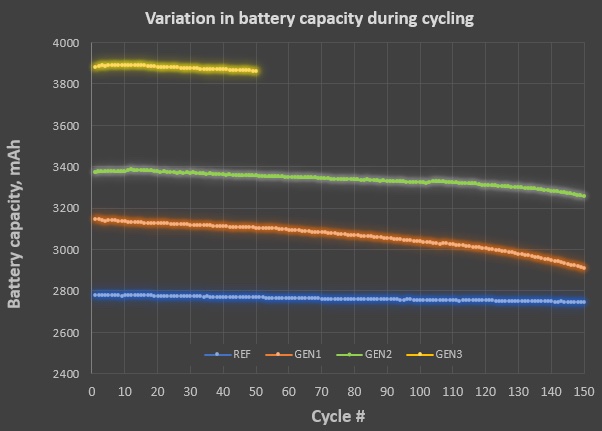
HPQ Silicon’s NOVACIUM GEN3 batteries show 40% capacity boost
by CM Staff
HPQ Silicon publishes the test results of its lithium-ion batteries.

The blue line shows the average capacity of 100% graphite batteries, the orange line, the average capacity of GEN1 batteries, and the green line the average capacity of GEN 2 batteries, over 150 charge-discharge cycle testing while the yellow line shows the average capacity of GEN3 batteries over 50 charge-discharge cycle testing. All readings are in milliampere-hours (mAh).
MONTREAL — HPQ Silicon says its France-based affiliate, NOVACIUM SAS, completes 50 charge-discharge cycle tests for its latest batch of Lithium-ion 18650 batteries.
These batteries use a blend of graphite and NOVACIUM’s partially optimized GEN3 silicon-based anode material. The GEN3 batteries demonstrated a capacity improvement of approximately 40 per cent over the graphite benchmark. This marks a 25 per cent increase over the previous GEN1 material and a 15 per cent increase over GEN2 material. The performance degradation in GEN3 batteries was minimal and comparable to that of the graphite benchmark, with both showing degradation within the testing protocol’s margin of error.
“Producing 18650 battery cells that excel in charge-discharge cycle testing and exceed 4,000 mAh under maximum discharge conditions (July 30th, 2024, release) further confirms our position as a top-tier producer of advanced silicon anode material,” said Dr. Jed Kraiem, COO of Novacium. “Based on these results and the data we’ve gathered, we are confident that we can continue improving our material, and that GEN4-based 18650 batteries could exceed the 4,400 mAh mark.”
In testing, the average capacity of three GEN3 batteries started at 3,883.0 mAh and decreased to 3,864.8 mAh after 50 cycles. In contrast, GEN2 batteries started at 3,370.1 mAh and ended at 3,356.0 mAh, and GEN1 batteries started at 3,145.5 mAh and fell to 3,105.4 mAh. The 100 per cent graphite batteries began at 2,780.0 mAh and decreased to 2,769.1 mAh.
The performance degradation of GEN3 material over 50 cycles retained 99.59 per cent of its capacity, compared to 99.61 per cent for the graphite benchmark, a difference considered within the margin of error.
“Achieving these results with full-size 18650 industrial batteries at 50 cycles further showcases Novacium’s ability to produce advanced silicon anode material that significantly enhances overall battery performance and integrates seamlessly into existing anode manufacturing facilities,” said Mr. Bernard Tourillon, president and CEO of HPQ Silicon and NOVACIUM SAS. “This seamless integration means that manufacturers can adopt this advanced silicon anode material without needing expensive retooling or process overhauls. It ensures a smoother transition, reduces downtime, and minimizes additional costs, ultimately accelerating the deployment of high-performance batteries in the market.”